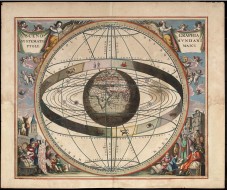Though the practices of astrology and astronomy have common roots, there is an important distinction in astrology vs astronomy today. Astronomy is the study of the universe and its contents outside of Earth’s atmosphere. Astronomers examine the positions, motions, and properties of celestial objects. Astrology attempts to study how those positions, motions, and properties affect people and events on Earth. For several millennia, the desire to improve astrological predictions was one of the main motivations for astronomical observations and theories.

J. van Loon, National Library of Australia
Astrology vs Astronomy
Astrology continued to be part of mainstream science until the late 1600s, when Isaac Newton demonstrated some of the physical processes by which celestial bodies affect each other. In doing so, he showed that the same laws that make, say, an apple fall from a tree, also apply to the motions of the celestial sphere. Since then, astronomy has evolved into a completely separate field, where predictions about celestial phenomena are made and tested using the scientific method.
In contrast, astrology is now regarded as a pastime and a pseudoscience — though thousands of people around the world still invoke advice from astrologers and astrology publications in making important professional, medical, and personal experiences. (This, despite the fact that current horoscopes rely on outdated information!)
Why Astrology "Works"
Yet there's a reason people continue to rely on horoscopes, and Senior Editor Alan MacRobert explains in Sky & Telescope's Focal Point column just why astrology is still so popular.
Read an excerpt here:
Planets have nothing to do with it. But that's not the point. If you want to get through to your believing sister-in-law or your uncle in Cincinatti, the way to do it is not to argue physics or astronomy, but to explain why astrology works.
I tell this with my own story. When I was in elementary school, I practiced a form of divination that you could call bazookamancy. Back then, Bazooka Joe bubble gum was popular. It came wrapped in a little comic strip about Bazooka Joe and his gang. The wrappers were on the ground wherever kids littered. As everyone knew, when you saw one, you stopped and asked it a question. Then you picked it up and read it. The comic was a parable that answered your question. Often you had to look mighty hard to find your answer. But if you looked hard enough, it was always there.
. . . I've described my practice of bazookamancy to two of my astrologer friends. Each of them lit up and say, "You've got it!" So at some level, they know it isn't about the planets, not if one form of divination is as good as another. Any reading or fluke or chance — any metaphor looking for its referent — will serve your uncle in Cincinnati just as well.
 2
2








Comments
October 26, 2014 at 3:53 pm
You Know, many Egyptians believe that Astronomy and Astrology are the same, and also believe that the Astrology is science and they rely on its predictions.
You must be logged in to post a comment.
Gingermoon20
January 6, 2020 at 12:19 am
The article is really interesting. I am an amateur Astronomer and Astrologer (funnily enough) once I can very well learn about the physic aspects of matter and the spirituality behind it. Most people take Astrology for granted when talking about it as a "system of predictions for the future or a set of traits which will define who you'll be" and that Western Astrology follows the constellations. Firstly, Astrology does not provide answers about the future but tells us about the possibilities that would come from celestial motion, like a game of probability; Also, it does not define you, it provides a tendency for behaviour in many areas of your life, we're born under their influence to work on their strengths and not be standardised. Second, the Tropical Zodiac used in the West does not tie the constellations to the signs rather these signs are tied to the Earth's ecliptic. Every 30 degrees of the apparent path of the sun on the Earth's sky is a sign. The Vedic astrology uses Sidereal astrology and THOSE are connected to the constellations. Lastly, Astrology is a pseudoscience once it cannot go through the scientific method. Nonetheless, I consider both much important types of science to understand the Universe.
You must be logged in to post a comment.
You must be logged in to post a comment.